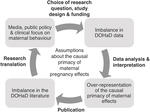Abstract:
Research on the developmental origins of health and disease (DOHaD) has traditionally focused on how maternal exposures around the time of pregnancy might influence offspring health and risk of disease. We acknowledge that for some exposures this is likely to be correct, but argue that the focus on maternal pregnancy effects also reflects implicit and deeply-held assumptions that 1) causal early life exposures are primarily transmitted via maternal traits or exposures, 2) maternal exposures around the time of pregnancy and early infancy are particularly important, and 3) other factors, such as paternal factors and postnatal exposures in later life, have relatively little impact in comparison. These implicit assumptions about the “causal primacy” of maternal pregnancy effects set the agenda for DOHaD research and, through a looping effect, are reinforced rather than tested. We propose practical strategies to redress this imbalance through maintaining a critical perspective about these assumptions.
Publisher's Version


